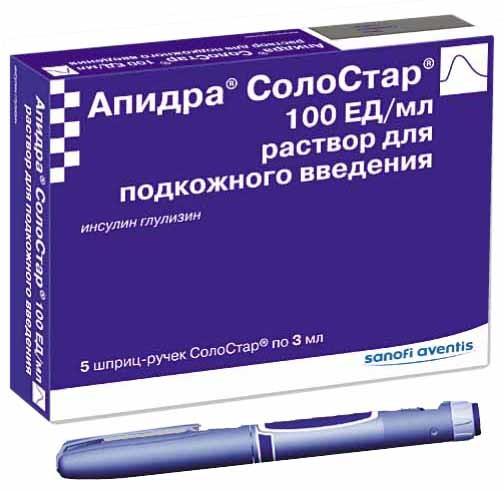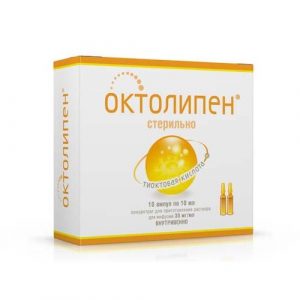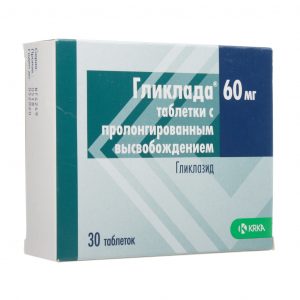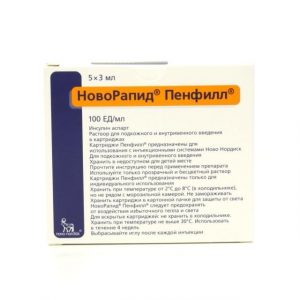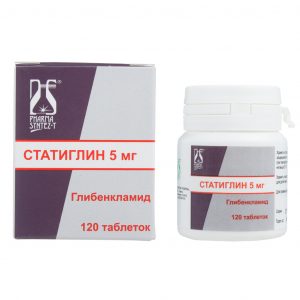Description
Latin name
APIDRA SoloStar
Packing
5 syringe pens of 3 ml.
Pharmacological action
Hypoglycemic drug. Insulin glulisin is a recombinant analogue of human insulin, which is equivalent in effect to ordinary human insulin. The action of insulin glulisin occurs faster, and the duration of action is shorter than that of standard human insulin. The mechanism of action of insulin glulisin is the regulation of glucose metabolism. Insulin preparations lower blood glucose levels by stimulating peripheral glucose uptake, especially skeletal muscle and adipose tissue, as well as by suppressing the production of glucose by the liver. Insulin suppresses lipolysis in adipocytes, inhibits proteolysis and stimulates protein synthesis. With sc administration, the action of insulin glulisin begins much earlier and lasts shorter compared to preparations of human insulin: its hypoglycemic activity begins in 10-20 minutes. The hypoglycemic effects of insulin glulisin and human insulin are equivalent when given intravenously. One unit of insulin glulisin has the same hypoglycemic effect as one unit of human insulin.
Indications
Treatment of diabetes in adults, adolescents and children 6 years of age and older when insulin therapy is needed.
Contraindications
Hypersensitivity to insulin glulisin or to any of the components of the drug Hypoglycemia.
Use with caution in pregnant women.
Use during pregnancy and lactation
There is insufficient information on the use of insulin glulisin in pregnant women. Animal reproductive studies have not revealed any differences between insulin glulisin and human insulin with respect to pregnancy, embryonic / fetal development, childbirth and postnatal development. Pregnant women should be careful when prescribing Apidra SoloStar. Careful monitoring of blood glucose levels is required. Patients with pre-pregnancy or gestational diabetes need to maintain optimal metabolic control throughout their pregnancy. During the first trimester of pregnancy, the need for insulin may decrease, and during the second and third trimesters, it can usually increase. Immediately after birth, insulin demand decreases rapidly. Nursing mothers may need a dose adjustment of insulin and diet.
Composition
1 ml contains insulin glulisin 100 UNITS (3.49 mg) excipients: metacresol (m-cresol), trometamol, sodium chloride, polysorbate 20, sodium hydroxide, hydrochloric acid, water d / u.
Dosage and administration
SC, shortly (0-15 minutes) before or shortly after a meal. Apidra SoloStar should be used in treatment regimens that include either medium-acting insulin, or long-acting insulin, or a long-acting insulin analogue. In addition, the drug Apidra SoloStar can be used in combination with oral hypoglycemic agents. The dosage regimen of the drug Apidra SoloStar is selected individually.
Side effects of
Hypoglycemia is the most common undesirable effect of insulin therapy, which can occur if too high doses of insulin exceed the need for it.
Adverse reactions observed in clinical trials associated with drug administration, Listed below are organ systems and in decreasing order of occurrence. When describing the frequency of occurrence, the following criteria are used: very often -> 10% often -> 1% and <10% sometimes -> 0.1% and <1% rarely -> 0.01% and <0.1% very rarely - <0.01%. From the side of metabolism: very often – hypoglycemia. Symptoms of hypoglycemia usually occur suddenly. However, usually neuropsychiatric disorders due to neuroglycopenia (feeling tired, unusual fatigue or weakness, decreased ability to concentrate, drowsiness, visual disturbances, headache, nausea, confusion or loss, convulsive syndrome) are preceded by symptoms of adrenergic counterregulation (activation of the sympathoadrenal system in response to hypoglycemia): hunger, irritability, nervous excitement or tremor, anxiety, pallor of the skin, cold sweat, tachycardia, palpitations (the faster hypoglycemia develops and the heavier it is, the more pronounced symptoms of adrenergic counterregulation). Attacks of severe hypoglycemia, especially recurring, can lead to damage to the nervous system. Episodes of prolonged and severe hypoglycemia can threaten the lives of patients, since with the increase in hypoglycemia, even a fatal outcome is possible. Local reactions: often local reactions of hypersensitivity (hyperemia, swelling and itching at the injection site). These reactions are usually transient and rarely disappear when treatment is continued – lipodystrophy (as a result of a violation of the alternation of places of insulin administration in any of the areas / administration of the drug at the same place /). Allergic reactions: sometimes – urticaria, chest tightness, bronchospasm, allergic dermatitis, itching. Severe cases of generalized allergic reactions (including anaphylactic) can be life threatening. overdose Symptoms: there is no specific data on the overdose of insulin glulisine possible hypoglycemia may develop to varying degrees of severity. Treatment: Episodes of mild hypoglycaemia can be stopped by taking glucose or sugar-containing products. Therefore, it is recommended that patients with diabetes constantly have pieces of sugar, candy, cookies, or sweet fruit juice. Episodes of severe hypoglycemia, during which the patient is unconscious, can be stopped in / m or n / to the introduction of 0.5-1 mg glucagon or in / in the introduction of dextrose (glucose). If the patient does not respond to glucagon administration for 10-15 min, dextrose I / O should also be administered. After regaining consciousness, it is recommended that the patient be given carbohydrates internally to prevent recurrence of hypoglycemia. After administration of glucagon to determine the cause of this severe hypoglycemia and prevent the development of other such episodes, the patient should be observed in the hospital. Storage conditions The drug should be stored out of the reach of children, protected from light at a temperature of 2 ° to 8 ° C, do not freeze! Expiration 2 years. dosage form drug vennaya form injection Sanofi-Aventis East, France
